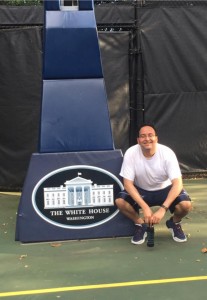 Bhargav Srinivasan, BHP ’12, is in his second year of a four-year JD/MBA joint degree program at Harvard. This past summer, he worked at the White House as an intern in the National Economic Council (NEC), working on finance policy for the Obama Administration.
Bhargav Srinivasan, BHP ’12, is in his second year of a four-year JD/MBA joint degree program at Harvard. This past summer, he worked at the White House as an intern in the National Economic Council (NEC), working on finance policy for the Obama Administration.
What did you work on in your internship?
I spent my time at the NEC working on policy across financial technology, financial regulation, and housing finance. We worked to inform the Administration’s perspective and also to “hardwire” our learnings so that the next administration can use what we’ve done to date.
I found particularly interesting the idea of fostering responsible innovation in financial technology. For example, blockchain applications, like Bitcoin and Ethereum, have the potential to change the way we store and transfer data and money. There is a lot of innovation in finance right now, so I think it’s more important now than ever before to develop smart regulation that simultaneously protects financial stability and shepherds consumers while fostering innovation.
How was the experience?
It was truly unforgettable. I gained amazing perspective on how government works which I had never had, but the real highlight of my summer were the people I met. First, the NEC staff shared with me their interesting perspectives from government, law, business, academia, and other industries. Next, I was blessed to have a group of interns who made my summer more enjoyable than I could have imagined. We came from all across the country to serve President Obama, and, in the process, became close friends. Finally, we met White House personnel through a speaker series. The speakers ranged the gamut from POTUS and VPOTUS to the directors of the NEC, DPC, and other White House offices. Meeting and having a personal conversation with FLOTUS is a memory I will never forget.
What were your main takeaways from the internship?
I learned about the White House’s power and its limits. The two sources of power are the bully pulpit and the staff’s ability to quarterback key issues. Though the bully pulpit is diminishing in a world of constant communication, the President still gets to shine a light on the issues he believes are most important.
On the other hand, the power to quarterback is executed by the staff who work with and on behalf of the President to get the right folks in the same room. Making policy requires coordination and stakeholder engagement. The Administration uses agencies to implement its vision, so it’s important to hear feedback and develop buy-in from the agencies and other key parties when forming policy. When key parties come together and feel invested, executing as a team behind a single policy vision becomes easier. To that end, the White House plays a crucial role.
Would you say Washington is more “West Wing” or “House of Cards” in your experience?
I actually love both shows! The fortunate reality is that Washington is more West Wing than House of Cards. Most people working in government are trying to do the right thing for the American people. It’s easy to be skeptical of centralized power and special interests, but I felt the White House staff were truly working as honest brokers. When it comes to technology, the staff stay abreast of activity in the market, weigh different regulatory approaches, and make an informed decision to proceed. I’m more optimistic about the future of government after having been in DC than before.
Any revelations from the experience?
I learned that driving big changes requires Congress, but the Executive branch can take smaller, wonkier actions to make people’s lives better. For example, agencies can make programs and policy enforcement more effective through rule-making and administrative discretion. I hope that more students interested in public policy consider a career in administration because it’s a good way to drive tangible change in discrete ways.
How is your joint degree program going at Harvard?
Great! I just finished year one of law school and started year one of business school at Harvard Business School. The volume of work in during the first year of law school was pretty grueling, so my law school friends joke that I’m on vacation, but business school has been just as busy in a more balanced way.
Our JD/MBA program has roughly 10 students per year, who form a strong community of 40 overall. It’s a diverse group with varied aspirations, so the best part of being in the program is learning from my peers. There are also quite a few BHP alums at both schools, especially HBS. I still ask for perspective from one of my first BHP mentors, Eric Sung (BHP ‘10, HBS ‘16).
How will the JD/MBA benefit you in the future?
The program offers a lot of value. First, I’m simultaneously developing skills as a GM and a lawyer that will make me a strong decision-maker in an organizational setting. Next, the joint degree allows me to keep open diverse long-term career options. Finally, my peers are amazing and form the basis for a strong network to start my career. I recommend the program to anyone who genuinely finds both fields interesting.


Proud of your accomplishments!! Keep going!!
Congratulations!!